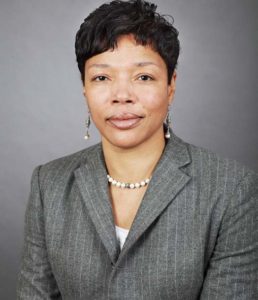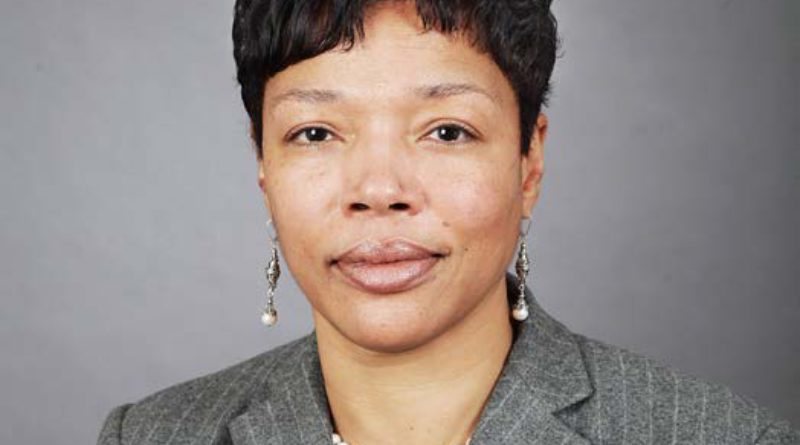Farewell Interview with Natalie Y. Rivers

“Everyone has a role in their own destiny.”
Executive Vice President & Chief Administrative Officer Natalie Y. Rivers will leave NYCHA after more than 27 years of service on September 25.
Natalie began her singular career here as a Staff Analyst in the Human Resources Department, “to pay off a college loan,” she recalled. She was soon promoted to Supervisor of the Retirement Counseling Unit and then to Chief of Staff Relations before leaving HR to serve as Senior Advisor to the EVP for Administration.
Natalie returned to HR as Deputy Director and was later promoted to Deputy to the General Manager, Chief of Staff, and finally to EVP & Chief Administrative Officer, a position she has held for 12 years—a record not soon to be surpassed by any EVP.
Natalie has held senior leadership positions at NYCHA during times of change and crisis. She has seen many roadmaps, re-engineering of business processes, and administration initiatives to meet new challenges and agendas.
Through it all, Natalie has been an invaluable resource not only for her corporate memory but for her forward thinking and ability to set new goals and direction.
Looking back on her career, here is some of what Natalie had to say.
What are some of your major accomplishments here?
I was never more proud of NYCHA than during our response to 9/11. I had the privilege of leading the Administration team in ensuring that all of our 90 Church Street offices were clean and safe after a reconstruction of the entire building, and that staff were comfortable and felt safe reoccupying the space.
Also, the establishment of NYCHA’s Leadership Academy for middle managers, in partnership with CUNY/ Baruch College. This professional development program ran for four years, and most of its graduates have advanced at NYCHA. Although the program lost its funding due to NYCHA’s fiscal climate, I believe that it can serve as a model for the future.
How about disappointments?
Administration is a support function, so the fiscal constraints we face have impacted our ability to provide the level of service that we should. I’m also disappointed that I will not be here to see NextGen NYCHA take hold. I would love to be part of the team that rights this complex organization, under the leadership of Chair Olatoye and GM Kelly. I’ll be loudly rooting for NYCHA from the sidelines.
How have you adjusted so well to NYCHA’s many changes?
I believe that change is good and that prior practice is not self-justification. At the same time, I feel part of my job is to use my institutional knowledge to share past challenges and mistakes and help to identify solutions so that we won’t experience a repeat of what went wrong.
What are the biggest changes you’ve seen here?
The change to the NYCHA board structure to include resident board members. Also, I am glad to see many more women and people of color in leadership roles.
How do you keep fresh and enthusiastic?
My challenges in Administration have changed as new areas have come under my my jurisdiction, such as the Customer Contact Center, Customer Operations, Research and Management Analysis, and the Office of the EPMO. This has allowed me to expand my expertise and appreciate more directly NYCHA’s impact on residents.
Also, our highly committed employees keep me going— if they can do it, so can I.
What do employees need to understand better?
Employees need to understand why they are asked to do something in a certain way, not just what they are asked to do. We need to know and understand how all the pieces of an operation connect to the whole process. This happens through communication and is what I tried to do with the Let’s Talk initiative that brought Customer Contact Center staff and development staff together to see how they could work more cohesively.
What would help employees succeed here?
Everyone has a role in their own destiny. You’ve got to be open to—and don’t shy away from—opportunities and you’ve got to put in the work to make that opportunity a reality. Also, exposure is important. Talk to people and seek out a mentor. Don’t be afraid to ask. I have mentored and have been mentored here.
What is NYCHA’s and public housing’s future?
Public housing is a must for this City due to its high cost of living. So public housing has to exist, but it may look different going forward. It is incumbent upon NYCHA and its stakeholders and partners to figure out how to preserve and maintain this precious resource. There are limits to what the City, State and federal government can do for us; this is the challenge ahead of NextGen NYCHA.
What would you like to add?
I leave NYCHA thankful to residents who kept me grounded; the Administration team for their unconditional support; colleagues who have stuck by me; and for all the opportunities I have been afforded. All of this has helped me become the woman I am today, and I like that person!







